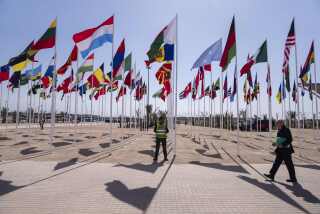IMF Reports $3-Billion Gap in Loan Repayment
- Share via
WASHINGTON — The International Monetary Fund said Sunday that U.S. banks and the lending institutions of other industrial nations gave $3 billion more to Third World countries than they got back during the first half of 1987.
The IMF, releasing figures for the first six months of the year, said “involuntary lending” to Mexico accounted for all of the difference.
In those six months banks paid out $3.5 billion in “concerted” loans to Mexico, which already owed over $100 billion. Banks call that involuntary lending, since it is made only under pressure from the 151 governments that own the fund. The United States holds the largest block of votes.
In the same period last year, banks got back $7 billion more from the Third World than they lent.
In recent years, banks have been making few loans on their own initiative to heavily indebted countries, despite urgings by Treasury Secretary James A. Baker III and others.
The World Bank, the fund’s sister organization, estimates Third World debt at more than $1 trillion. The fund offered no new figure but said total debt rose in the first half of the year not only because of the new loans but also because Third World countries fell behind another $2 billion in payments of interest on old ones.
Brazil caused a major jump in the arrears by suspending its interest payments last February on about $68 billion of its debt to banks.
Payments of interest and small amounts of principal are costing Third World countries about $30 billion a year, an expense their leaders complain has crippled development. At the end of last month, the presidents of eight Latin American countries said they may have to reduce their payments on $343 billion worth of debt, unless lenders give them some relief.
Traditionally, developing countries borrow a lot more than they pay back. Ideally the money goes into new projects that create jobs and raise living standards.
“Hundreds of banks now just say no” to new Third World loans, according to Robert D. Sloan. Until earlier this year he was the vice president at the First National Bank of Chicago in charge of lending to foreign governments.
The fund’s latest figures also show that Third World countries increased their deposits in banks by $18.5 billion the first half of 1987, in contrast to $18 billion in net withdrawals in the first half of 1986.
“Almost all of this increment reflected higher official foreign exchange reserves and came mainly from Taiwan . . . and Mexico,” said the fund’s monthly IMF Memorandum.
Taiwan has been accumulating dollar reserves in large part by heavy sales of its goods to the United States. U.S. officials complained that Taiwan authorities have not let their currency rise in value against the dollar as much as other currencies have done. A higher price for the Taiwan dollar would make Taiwanese goods more expensive and less saleable in the United States.
Mexico has been accumulating reserves by increased exports of other goods in addition to oil. Last month, when many wealthy Mexicans wanted to sell pesos and buy dollars, the Mexican government held on to its reserves of dollars and allowed the price of the peso to drop sharply.
More to Read
Sign up for Essential California
The most important California stories and recommendations in your inbox every morning.
You may occasionally receive promotional content from the Los Angeles Times.













